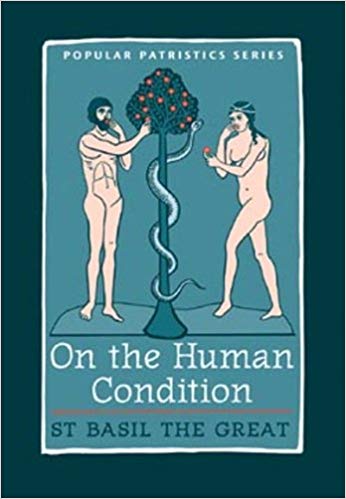
Author:
Basil the Great was born in 329 in Caesarea. He is one of the three Cappadocian fathers. The other two being Gregory of Nyssa, his brother, and Gregory of Nazianzus, known as the Theologian, his friend. Together they
combatted the Arian heresy. Basil’s father was a lawyer and orator while his uncle was a bishop. His sister, St. Macrina, had an immense influence on him choosing the ascetic life. Two of his brothers became bishops: Gregory of Nyssa and Peter of Sebaste. Basil received education in law and oratory in Athens where he befriended Gregory of Nazianzus. Later, Basil would become a monastic. Basil eventually became metropolitan of Cappadocia with a few bishops assisting him. He successfully led the flock to Christ, protected it from the Arian heresy and established philanthropy centres that cared for the poor, sick and sojourners. He reposed in the Lord on January 1st, 379.
Context:
On the Human Condition is a book containing a sample of the works of Basil the Great. The first two homilies in
the book can be seen as an epilogue of his book Hexameron. The book Hexameron, better known as Six Days of Creation, deals with Genesis 1. The first two homilies of this book deal with Genesis 2 and 3. The book contains three other homilies, a letter and a selection of rules which have likely been produced during his bishopric.
Content:
- First Homily: On the Origin of Humanity – Discourse 1: On that Which is According to the Image
- Second Homily: On the Origin of Humanity – Discourse 2: On the Human Being
- Homily Explaining that God is Not the Cause of Evil
- Homily Against Anger
- Homily on the Words “Be Attentive to Yourself”
- Letter 233, to Bishop Amphilochius who Asked a Question
- Long Rules, Selections
Relevance:
The first two homilies continue to be relevant today as they deal with existential questions many go through: Who am I? Where did we come from? What are we intended to do? What does it mean to be human? The homily following that serves to answer a question Christians get asked often today: If God is good, why is there evil in the world? The homily against anger gives practical ways of overcoming such passion. When man is cleansed from anger, he begins the journey of becoming on the likeness of God. “Be attentive to Yourself” deals with the concept of watchfulness in relation to the cleansing of vices and the cultivation of virtues. The homily serves to direct its reader to the things (s)he can learn from the structure of the body and the nature of the mind and soul. The question of Amphilochius has to do with the nature of the soul in relation to good and evil, virtues and vices. Basil’s response clarifies the neutral state of the soul which freely chooses good or evil. The final section “Long Rules” takes the form of a catechism with questions and answers. It is not a set of rules as the title suggests. Overall, the book is a good introduction to Christian anthropology. It also serves to introduce the reader to the path of virtue and attaining the likeness of God while keeping in mind the limitations of our humanity.
If you would like to read this book, consider using this link to buy it from amazon: https://amzn.to/2FOPYgC
+ God bless +
